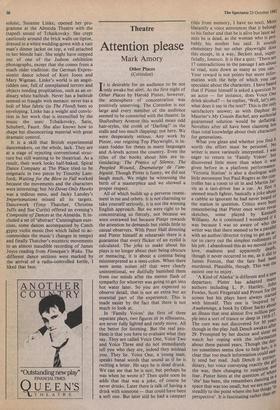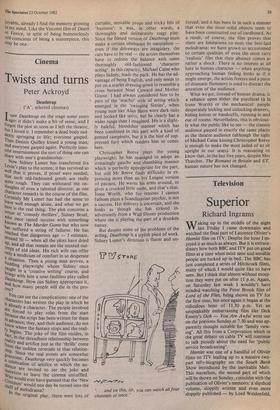Theatre
Attention please
Mark Amory
Other Places (Cottesloe)
It is desirable for an audience to be not only awake but alert. At the first night of Other Places by Harold Pinter, however, the atmosphere of concentration was positively unnerving. The Cottesloe is not large and every member of the audience seemed to be connected with the theatre. In Shaftesbury Avenue this would mean odd hair-styles, the croak of 'Darling!' in the stalls and too much clapping; not here. We were desperately serious. Any work by Pinter, our reigning Top Playwright, is in- stant fodder for theses in many languages and A-levels across the country. Even the titles of the books about him are in- timidating: The Poetics of Silence, The Peopled Wound, Dramaturge de ram- biguite. Though Pinter is funny, we did not laugh much. We might be witnessing the birth of a masterpiece and we showed a proper respect.
All of which builds up a perverse resent- ment in me and others. It is not charming to take yourself seriously, it is not the winning English approach. But we were right to be concentrating so fiercely, not because we were overawed but because Pint,er rewards the attention he demands but yields little to casual observers. With Peter Hall directing and Pinter himself at rehearsals there is a guarantee that every flicker of an eyelid is calculated. The joke to make about his plays is no longer about their being obscure or menacing, it is about a comma being misinterpreted as a semi-colon. When there were some noises off that were clearly unintentional, we dutifully banished them from our minds after the merest flash of sympathy for whoever was going to get into hot water later. So you are expected to observe detail, that is not an extra but an essential part of the experience. This is made easier by the fact that there is not much to look at.
In 'Family Voices' the first of three separate plays, two figures sit in silhouette, are never fully lighted and rarely move. All the better for listening. But the real pro- blem is that you have to evaluate what they say. They are called Voice One, Voice Two and Voice Three and do not immediately tell you who they are, indeed they mislead you. They lie. Voice One, a young man, speaks banal words that sound as if he is reciting a letter. He says he is dead drunk. We can see that he is not; but perhaps he was when he wrote it? Then quite soon he adds that that was a joke, of course he never drinks. Later there is talk of having a drink with someone — that could have been a soft one. But later still he had a campari
(this from memory, I have no text). More blatantly a voice announces that it belongs to his father and that he is alive but later ad- mits he is dead, as the woman who is pro- bably his mother has said. It sounds elementary but no other playwright does this except, in a way, Beckett and, super- ficially, Ionesco. It is like a quiz: 'There are 17 contradictions in the passage I am about to read, note down as many as you can. Your reward is not points but more infor- mation with the help of which you can speculate about the characters. I have heard that if Pinter himself is asked a question by an actor — for instance, does Voice One drink alcohol? — he replies, 'Well, let's see, what does it say in the text?' This is the onlY satisfactory answer; as with Daphne du Maurier's My Cousin Rachel, any authorial guaranteed solution would be deflating. Novelists after all have been claiming less than total knowledge about their characters for generations. What you glean and whether you find it worth the effort must be personal. No writer is more variously interpreted. 1 Was eager to return to 'Family Voices' but discovered little more than when it was given before in a platform performance. `Victoria Station' is also a duologue with little movement but Paul Rogers as the con- troller has a room to sit in and Martin Jar" vis as a taxi-driver has a car. At first it seemed much lighter, basically a joke about_ a cabbie so ignorant he had never heard 01 the station in question. Critics were busy remembering that Pinter once wrote revue sketches, some played by Kenneth Williams. As it continued I wondered if 11 was because I was so aware of who the, writer was that there seemed to be a parallel with an author/director trying to get an ac- tor to carry out the simplest rudiments 01 his job. I abandoned this as we moved on to love, madness and apparently death, though it never occurred to me, as it did to James Fenton, that the fare had been murdered. Plausible, though. This was the easiest one to enjoy. 'A Kind of Alaska' is different and a new departure. Pinter has adapted marl! authors including L. P. Hartley, Jolwe Fowles, Scott Fitzgerald and Proust for the screen but his plays have always with himself. This one is 'inspired by Awakenings, a book by Oliver Sacks about an illness that sent almost five million Pe.7. ple into a sort of trance or sleep in 1916-1_1 The cure was not discovered for 50 Yoil, though in the play Judi Dench awakes aftc_ 29. Prompted by her doctor and sister .gioc watch her coping with the informati about these passed years. Though the dots startec!
tor sometimes seems slow to help her, 1'1 clear that too much information could eaosl. ly send her mad. Judi Dench is extra ;,r1 dinary, her voice conveying exactly the gd she was, then changing to suspicion . _..e fear. Pinter hints at the question of wrf a 'she' has been, she remembers dancing Tog space that was too small; but we are 01",;n steadily to the point where she has things', perspective'. It is fascinating rather than en j0Yable, already I find the memory growing in my mind. Like the Visconti film of Death 'n Venice, in spite of being humourlessly self-conscious of being a masterpiece, this may be one.











































 Previous page
Previous page